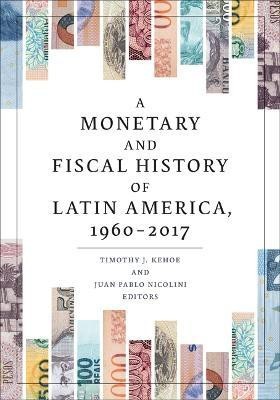A Monetary and Fiscal History of Latin America, 1960-2017(English, Paperback, unknown)
Quick Overview
Product Price Comparison
A major, new, and comprehensive look at six decades of macroeconomic policies across the region What went wrong with the economic development of Latin America over the past half-century? Along with periods of poor economic performance, the region's countries have been plagued by a wide variety of economic crises. This major new work brings together dozens of leading economists to explore the economic performance of the ten largest countries in South America and of Mexico. Together they advance the fundamental hypothesis that, despite different manifestations, these crises all have been the result of poorly designed or poorly implemented fiscal and monetary policies. Each country is treated in its own section of the book, with a lead chapter presenting a comprehensive database of the country's fiscal, monetary, and economic data from 1960 to 2017. The chapters are drawn from one-day academic conferences-hosted in all but one case, in the focus country-with participants including noted economists and former leading policy makers. Cowritten with Nobel Prize winner Thomas J. Sargent, the editors' introduction provides a conceptual framework for analyzing fiscal and monetary policy in countries around the world, particularly those less developed. A final chapter draws conclusions and suggests directions for further research. A vital resource for advanced undergraduate and graduate students of economics and for economic researchers and policy makers, A Monetary and Fiscal History of Latin America, 1960-2017 goes further than any book in stressing both the singularities and the similarities of the economic histories of Latin America's largest countries. Contributors: Mark Aguiar, Princeton U; Fernando Alvarez, U of Chicago; Manuel Amador, U of Minnesota; Joao Ayres, Inter-American Development Bank; Saki Bigio, UCLA; Luigi Bocola, Stanford U; Francisco J. Buera, Washington U, St. Louis; Guillermo Calvo, Columbia U; Rodrigo Caputo, U of Santiago; Roberto Chang, Rutgers U; Carlos Javier Charotti, Central Bank of Paraguay; SimOn Cueva, TNK Economics; JuliAn P. DIaz, Loyola U Chicago; Sebastian Edwards, UCLA; Carlos Esquivel, Rutgers U; Eduardo FernAndez Arias, Peking U; Carlos FernAndez Valdovinos (former Central Bank of Paraguay); Arturo JosE Galindo, Banco de la RepUblica, Colombia; MArcio Garcia, PUC-Rio; Felipe GonzAlez Soley, U of Southampton; Diogo Guillen, PUC-Rio; Lars Peter Hansen, U of Chicago; Patrick Kehoe, Stanford U; Carlos Gustavo Machicado Salas, Bolivian Catholic U; JoaquIn Marandino, U Torcuato Di Tella; Alberto Martin, U Pompeu Fabra; Cesar Martinelli, George Mason U; Felipe Meza, Instituto TecnolOgico AutOnomo de MExico; Pablo AndrEs Neumeyer, U Torcuato Di Tella; Gabriel Oddone, U de la RepUblica; Daniel Osorio, Banco de la RepUblica; JosE Peres CajIas, U of Barcelona; David Perez-Reyna, U de los Andes; Fabrizio Perri, Minneapolis Fed; Andrew Powell, Inter-American Development Bank; Diego Restuccia, U of Toronto; Diego Saravia, U de los Andes; Thomas J. Sargent, New York U; JosE A. Scheinkman, Columbia U; Teresa Ter-Minassian (formerly IMF); Marco Vega, Pontificia U CatOlica del PerU; Carlos VEgh, Johns Hopkins U; FranCois R. Velde, Chicago Fed; Alejandro Werner, IMF.


